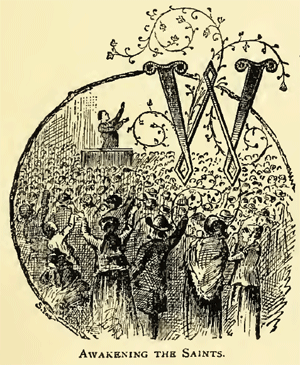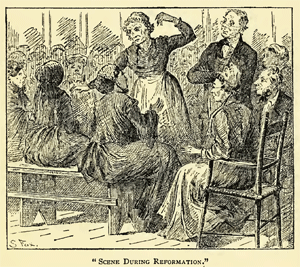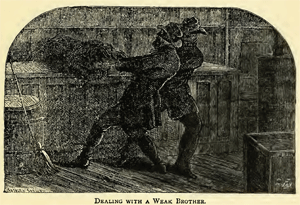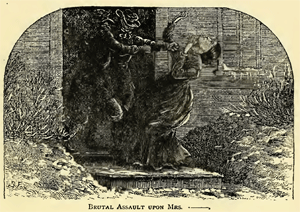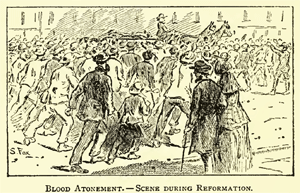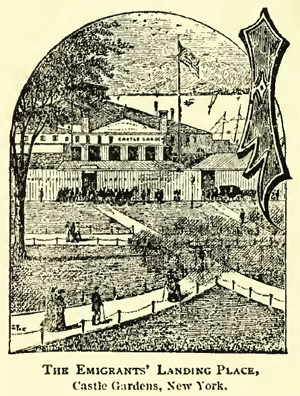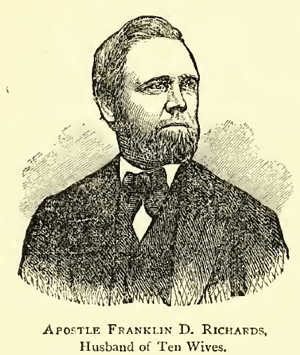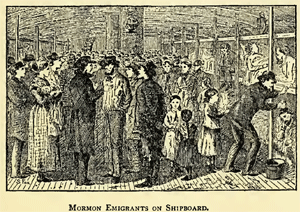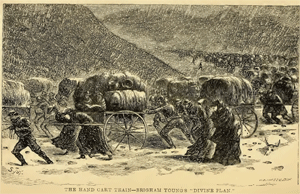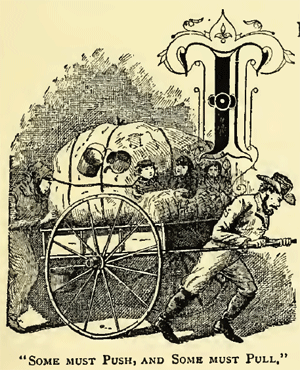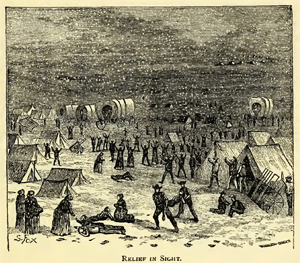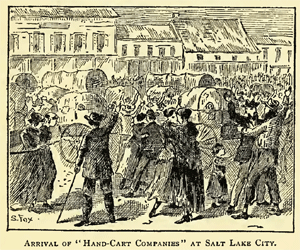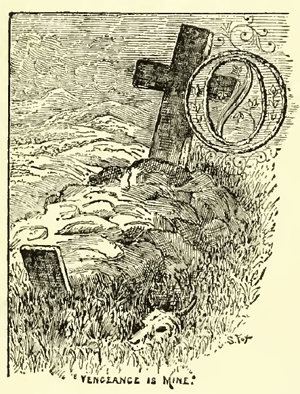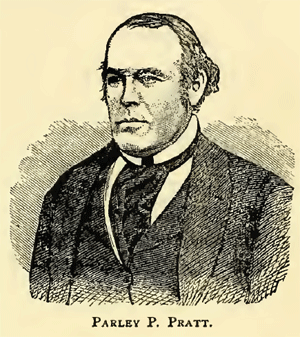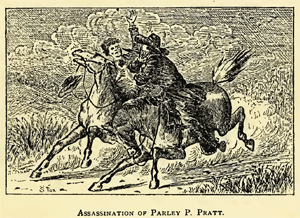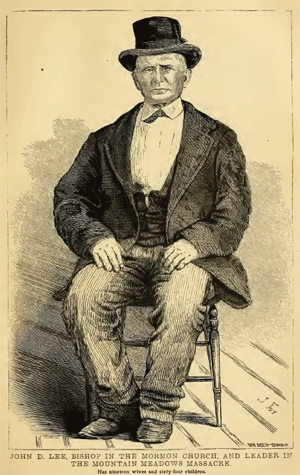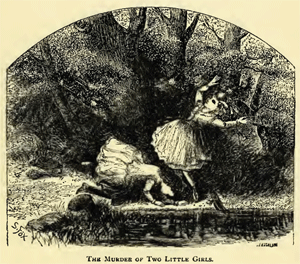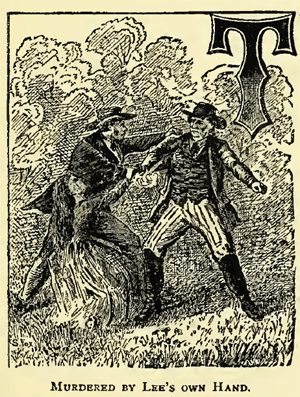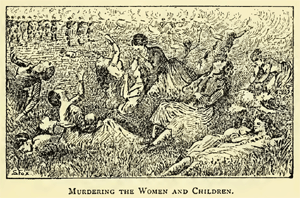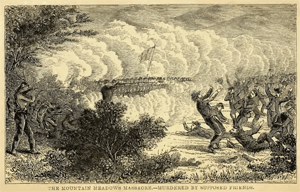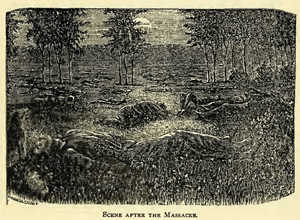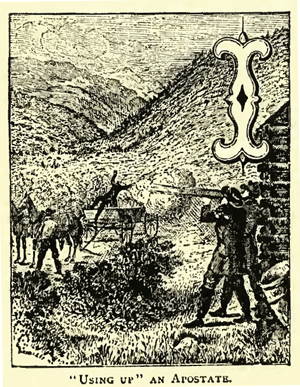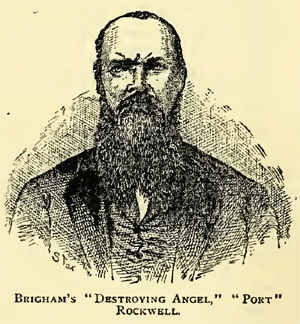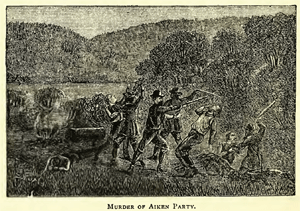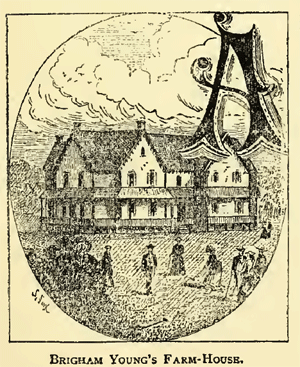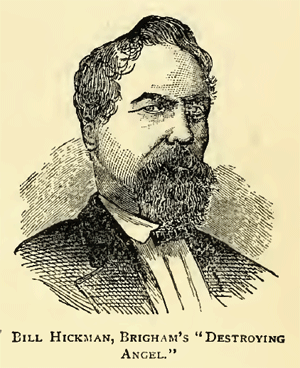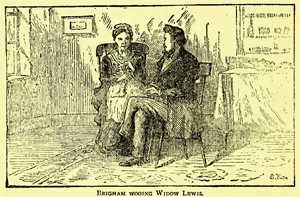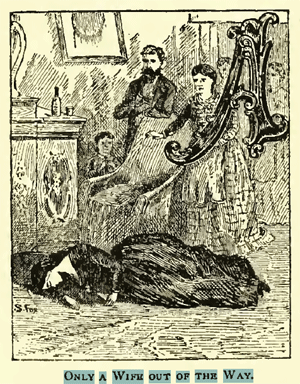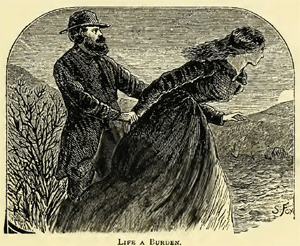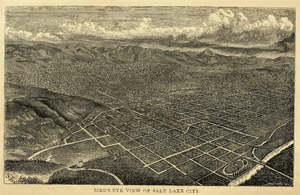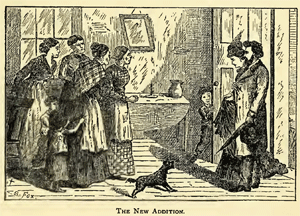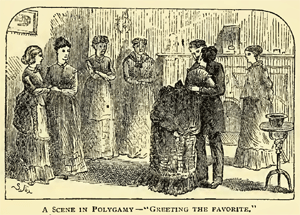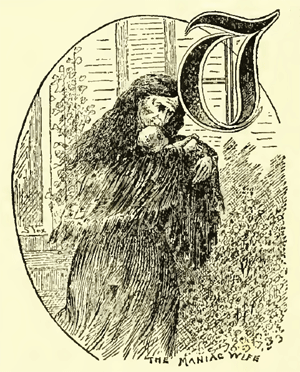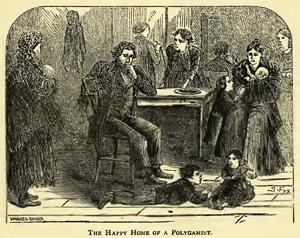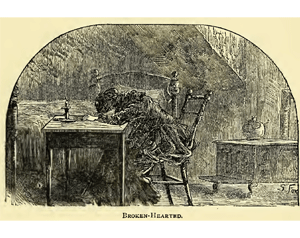"Killed by the Indians." How Apostates Disappeared. A Suspicious Fact. How Brigham "took care" of the People's Property. The Mormon Battalion. Brigham Pockets the Soldiers' Pay. How Proselytes were Made. Scapegraces sent on Mission. My Father goes to Europe. How Missionaries' wives are Left. Collecting funds for the Missionaries. Brigham Embezzles the Money. The "Church Train." Joseph A. Young as a Missionary. His Misdoings in St. Louis. What Brother Brown said of Him. The Perpetual Emigration Fund. How the Money was Raised. Cheating the Confiding Saints. How Brigham Manages the Missionaries' Property. The "Church" makes Whiskey for the Saints. The Missionaries bring home new Wives. How English Girls are Deceived. My First Baptism.
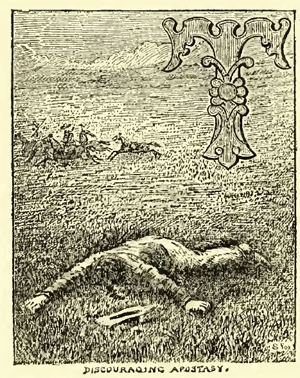
DISCOURAGING APOSTASY.
THE first years of life in a new country are full of hardships, peril, and adventure, and all these the Mormon people met.
I can remember listening in round-eyed wonder and terror at recitals of Indian atrocities, for we were surrounded by the wandering Southern tribes, and they were constantly thieving from us, and a murder was by no means an uncommon thing. When a man left home and failed to return, the general verdict, as a matter of course, was, "killed by the Indians." Did an exploring party visit the Territory, and fail to leave it again, their fate, if it was ever alluded to at all, was regarded as "massacred by Indians."
It is a significant fact that most of the persons who thus perished were Gentiles, apostates, or people who, for some reason or other, were suspected by, or disagreeable to, Brigham Young; and it came presently to be noticed that if anyone became tired of Mormonism, or impatient of the increasing despotism of the leader, and returned to the East, or started to do so, he invariably was met by the Indians and killed before he had gone very far.
The effect was to discourage apostasy, and there was no one but knew that the moment he announced his intention of leaving Zion and returning to "Babylon," he pronounced his death sentence. He was never discouraged from his plans, nor was any disapprobation of his course expressed. The faces were as friendly that he met every day, the voices just as kind; his hand was shaken at parting, and there was not a touch either of warning or sarcasm in the "God speed" and bon voyage. But he knew he was a lucky man if, in less than twenty-four hours after leaving Salt Lake City, he was not lying face downward on the cold earth, shot to death by an unerring rifle ball, while the stars looked sorrowfully down, silent witnesses, on this deed of inhuman butchery, and a man rode swiftly cityward, carrying the news of the midnight murder to his master, who had commanded him in the name of his religion to commit this deed, and send an innocent soul before its Maker. "Ah, poor fellow; killed by the Indians," said all his friends; but Brigham Young and Bill Hickman or "Port" Rockwell knew better.
The Indians have been convenient scapegoats and alternate allies and enemies to Brigham Young. But he has managed to make warfare, even with them, a profitable thing for himself.
Indians are notoriously thievish ; they will steal from each other, and from their very best friends. Civilization, even, doesn't seem to take the taint from their characters; they positively can't keep their hands off what doesn't belong to them.
As a matter of course, the Mormons, being their near neighbors, suffered very much from their depredations. They would often steal an ox, or, indeed, a large number of cattle, when they could do so with comparative safety; the owners would soon be on their trail, and would pursue them until they reached them; and sometimes both Mormons and Indians would be killed.
On occasions like these a proclamation would be issued, by the "authorities," for the brethren to fit themselves out for a campaign of indefinite length for the purpose of quelling the "Indian disturbances," and suppressing the trouble; and Brigham, who always has an eye to the main chance, generally managed in some mysterious manner to make large sums of money out of these "wars," as they were called.
Sometimes the manner of the money-making was not at all mysterious. There is one case in particular which I have often heard spoken of by my mother and other Mormons, who would have disapproved of the proceedings, and even called them dishonest, had they dared; but none of them ventured to connect such an adjective as that to the Prophetic name.
At this particular time he became so very anxious for his people's welfare, and so earnest in his endeavors to "protect" their property, that he sent Captain William Walls, of Provo, with a company, to collect all the surplus stock from the settlements south of Salt Lake, and drive them into the city for safe-keeping, reserving only the necessary teams and the milch cows. The orders were very absolute to "drive every hoof that could be spared."
At Cedar City, Iron County, there were three men who as absolutely refused to give up their stock, as that was all they had to depend upon; for, being poor men, with large families, they naturally preferred to keep what property they had where they could look after it themselves, feeling certain that they would take quite as careful an interest in it as a stranger would.
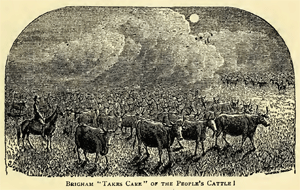
BRIGHAM "TAKES CARE" OF THE PEOPLE'S CATTLE!
The names of these rebellious men were Hunter, Keer, and Hadshead. They insisted upon defending their property, and the captain commanded them to be arrested and put in irons, and then he started with them for Salt Lake City, having previously secured all their stock. When they arrived at Parowan, they were chained together and confined in the school-house, there being no prison or jail in the place.
They were met by George A. Smith, who at that time was on a visit to the southern settlements; and he, thinking the men were treated with unnecessary harshness, ordered their irons taken off, and them set at liberty and allowed to return to their families -- without their stock, however. These men, after suffering such indignities, could live among the Mormons no longer, and they left for California.
Their stock, with a large herd of cattle collected in that vicinity, was driven to Salt Lake City, where they remained until they were in proper order for sale, when Brigham sold every one of them to pay a large debt which he owed to Livingston and Kincade, Salt Lake merchants.
This was his somewhat novel method of "protection." The cattle, to be sure, were out of the reach of the Indians, but they were equally out of the reach of their lawful owners, who neither saw them again nor any money which accrued from the sale of them.
Some of the owners ventured to ask if they might be turned in for tithing, but the inspired Prophet of the Lord replied, "No; if you had kept them, the Indians would have stolen them, and you are as well off as you would have been if I had not taken them." So was he, and several hundred dollars better off, too.
This reminds me of another instance of Brigham's faculty for "turning things to account," or, as a young Mormon quite wittily said, "taking advantage of his opportunities;" although it has nothing to do with the Indians, yet it occurred at an even earlier date, and was among the first of his notoriously dishonest transactions.
At Council Bluffs, as early as 1846, he counselled five hundred of his followers to enlist in the service of the United States; recruits being wanted at that time for the war in Mexico. They went without a question, on being assured that their families should be cared for. The church at that time was camped on the Missouri River, on its way from Nauvoo to Salt Lake.
The Mormon soldiers -- commonly called "The Battalion" -- sent all their pay to their families, to the care of Brigham Young, and he cared for it so well that the poor families never received it. John D. Lee brought the money which was collected from the soldiers, amounting to several thousand dollars, and gave it to Brigham. The families of these soldiers were, many of them, nearly starving, and all of them were very poor, needing sadly the money that their husbands had sent them; and in the face of all this destitution and suffering Brigham Young bought goods in Missouri to take out to the Valley, and if a soldier's wife ventured to ask him for anything, no matter how trifling it might be, she was rudely repulsed, usually without the slightest excuse for not giving her what was rightfully her own.
The men served in the army two years, receiving pay all the time, which Brigham pocketed, and all the time their families lived on the banks of the Missouri in the most squalid poverty, while Brigham came to Salt Lake in the most comfortable manner possible at that early day, and lived on the provisions that he had brought with him, bought with the money that was not his. He lived in what would be called luxury for the time and the place, by literally taking the bread out of the mouths of hundreds of needy women and children.
When these men came to Utah, after having been honorably discharged, they, of course, expected to find their families there. What was their surprise on learning that they were still at Winter-Quarters, and that no arrangements had been made for bringing them to the Valley! The President of the church would not allow them to go for them until the next spring, and when they did find them in such a wretched, helpless condition, it is no wonder that so many of them apostatized, and refused to believe in a religion whose chief teacher could be capable of such heartless cruelty and mean dishonesty.
It is asserted, by those who have the best means of knowing, that this war put twenty thousand dollars in Brigham Young's pocket; and yet he is very fond of talking about the cruelty and tyranny of the United States government in forcing five hundred of the ablest Mormon men into its service at a time when they were the most needed, and leaving the weak and helpless to cross the plains without sufficient protection.
The Mormons have always been very enthusiastic on the subject of missions. Probably no other church has done so much both home and foreign missionary work as the Church of Latter-Day Saints. They began by travelling about the country, making converts wherever they could, in the days when the entire church, could easily be numbered: as they increased in numbers they extended their work across the ocean, and now nearly all the work is done in England, Norway, Sweden, and Denmark.
It is a very rare thing nowadays to hear of an American convert, and the southern European nations never did take kindly to the faith.
Brigham Young was among the very earliest of missionaries, and he was very successful at proselyting. He was very different then from the haughty, arrogant blusterer of to-day. He and his brother Joseph were the first Mormons that my mother ever saw, and I have very often heard her describe the peculiar influence they exerted over her, and the manner in which they impressed her.
MORMON APOSTLES.
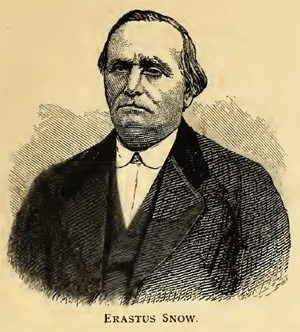
ERASTUS SNOW
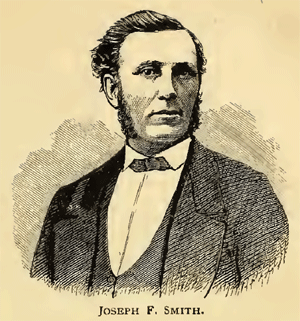
JOSEPH F. SMITH.
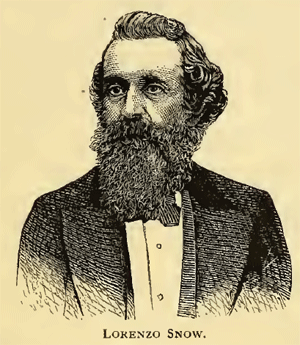
LORENZO SNOW
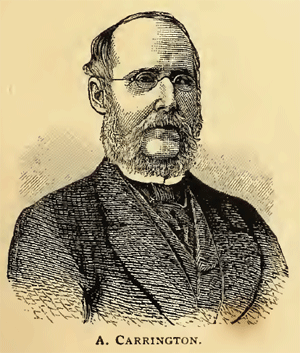
A. CARRINGTON.
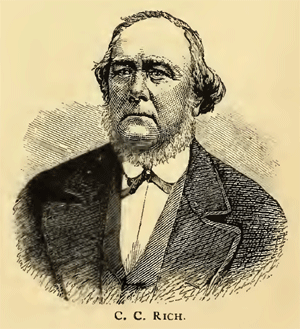
C.C. RICH.
To her they seemed very humble men, of the most earnest, devoted piety and intense religious zeal, travelling about "without purse or scrip," meeting with ridicule, derision, and persecution, while they preached "the gospel as taught by Christ and his Apostles." They came to a house where she chanced to be visiting, and, after seating themselves, commenced singing one of those earnest, stirring hymns for which the Mormons were at that time celebrated.
" Hark! listen to the trumpeters,
They call for volunteers.
On Zion's bright and flowery mount,
Behold their officers.
Their horses white, their armor bright,
With courage bold they stand;
Enlisting soldiers for their king,
To march to Zion's land.
We want no cowards in our bands,
That will our colors fly;
We call for valiant-hearted men,
Who're not afraid to die;
Sinners, enlist with Jesus Christ,
Th' eternal Son of God,
And march with us to Zion's land,
Beyond the swelling flood."
They were fine singers, both of them, and they threw so much fire and fervor into this song that my mother -- young, enthusiastic girl of sixteen -- made up her mind on the spot to enlist and follow this new army to Zion.
She was baptized and confirmed by Brigham Young almost immediately, and to use her own language, "There was nothing arrogant, haughty, or tyrannical, either in his (Brigham Young's) or Heber Kimball's appearance, as they pronounced, in the most fervent manner, such glorious blessings upon me, a poor ignorant girl, with no one to guide me, but who had given up my little all in this world to follow their teachings, which to me at that time meant the teachings of Christ."
No sooner had the Saints become fairly settled in Utah than Brigham Young commenced sending the brethren off on missions. He had, and still has, a peculiar way of managing, quite original with himself. A few of the leading members of the church were sent; indeed, at that time one or more of the apostles was kept in England all the while, and different elders were sent to relieve each other, and to assist the apostle in taking charge of the "Branches," and starting mission churches, which were afterwards held in charge by some resident brother, who was appointed elder. In addition to these elders, any one who displeased the Prophet was "sent on a mission" as a punishment. Did the polygamous Prophet fancy a man's wife, he was sent to the farthest possible point from Zion, to "enlist" souls for the Mormon Church. If any young man is suddenly started "on a mission" to preach the gospel and win souls to Christ, it is safe to argue that "he has been a little wild," and is accordingly exiled for a while.
My father was sent to England not very long after our arrival in the Valley, and he had charge while there of the Sheffield branch of the church. My mother and myself lived part of the time in Salt Lake City with Elizabeth and her family, and the remainder of the time in Payson. As the missionaries are all expected to give their services, and as they are obliged to go when ordered, whether they wish to or not, the wives have to take care of themselves as best they may. They certainly can expect no aid from their husbands, and they never receive it from the church; so, unless they can do something to support themselves while they are left in this way, they are pretty sure to suffer discomfort, and many times actual want. My mother was equal to the occasion, however, and we got on better than most Mormon families do whose "head" has gone on a mission. My mother taught school most of the time, either in the city or in Payson, and during all the time I studied with her.
Before sending his missionaries to England, Brigham one Sunday addressed the people in the Tabernacle very much after this fashion:
"Brethren and sisters, the time has been when we were compelled to travel without purse or scrip, and preach the gospel. We have had to beg our way of an ungodly world, and have gone, like the Apostles of old, trusting the Lord to provide for us. And," continued he, waxing excited over his subject, "I have travelled on foot the length and breadth of the United States with my shoes full of blood. Foot-sore and weary, I have often arrived at a house and asked for a night's lodging. I was hungry and cold; yet I was turned away; and many a time I have shaken the dust off my feet as a testimony against those people. But now I want the elders to travel independent of the Gentile world." Then, after reading the names of those whom he had selected to go, he proceeded with his address:
"Brethren and sisters, the missionaries must be supplied with the necessary funds to defray their expenses. And I want this whole people to come forward and donate freely for this purpose. I do not suppose you are all prepared to-day, but you can call at the office to-morrow and leave the money with my clerk; or we will have another meeting for the purpose of receiving donations, and so give all the opportunity of assisting in the noble work of sending missionaries to a foreign land."
As an answer to this appeal there was a large sum raised, the people responding generously to this call for assistance, and there was sufficient to carry all the laborers to their appointed fields. What was the surprise, then, of these men, when calling on the Prophet previous to their departure, and referring to the subject, they were coolly told by Brother Brigham that there was no money for them "not one cent"!
"But what are we to do?" said the bewildered and disappointed men, who had relied on this money to assist them.
"You must go to Bishop Hunter; I have nothing for you," was the careless and heartless reply.
Accordingly they went to the Presiding Bishop, and after telling him their errand, and that they had been sent by President Young, he informed them that there was a "church train" of three hundred wagons going East, which would take them to the frontiers for forty dollars apiece;" and after that," said the bishop, "you must get to your fields of labor as best you can."
Now, the Mormon elders in those days were poor, and could barely support their families when they were at home. And to be informed, just at the last moment, when they had supposed they were well provided for, that they must defray their own expenses to England, was really a hard blow for all of them. And yet such was their devotion to their religion, that each one paid his forty dollars to ride to the frontier in the "church" wagons, and then made their way to England at their own expense.
The Saints supposed that these wagons were sent out for the purpose of bringing emigrants from the Missouri River; but on their return they were loaded with freight, for which Brigham received twenty-five dollars a hundred. Between the amount paid for the passage of the missionaries and the loads of freight on the return, this "church train" certainly paid the head of the church very handsomely for that one trip.
Among the missionaries to England, during my father's residence there, was Joseph A., the Prophet's eldest son, who has recently died. He has always had the reputation among the Saints of being a very "fast" young man. In order, if possible, to cure him of some of his propensities for evil-doing, his father decided to send him on a mission, to carry the light of the everlasting gospel to the benighted nations of the earth. When men of family are sent, it is generally because Brigham wants something belonging to them which he cannot get if they are allowed to stay at home; and single men are often sent to convert the world, who are not capable of writing their own names in a legible manner.
But Joseph A. was sent because his father did not know what else to do with him; he had become so dissipated and caused so much trouble at home.
On his way Joseph stopped a few days in St. Louis, after which he went immediately to England. He was appointed in my father's pastorate, he being at that time pastor over several conferences. Everything was moving on harmoniously, when another Mormon elder, named Brown, arrived from America, telling some hard stories about Joseph's conduct while in St. Louis.
Mr. Brown circulated the reports that Joseph had drank immoderately, several times had been beastly drunk, and had constantly and habitually visited most disreputable resorts; in fact, that his conduct while in that city had been marked by the most profligate excesses, and that it had also been notoriously open, very little attempt being made on his part to hide it. He seemed to fancy that his personality was sufficient protection from scandal, and that the gossips would not wag their tongues over the misconduct of a son of Brigham Young.
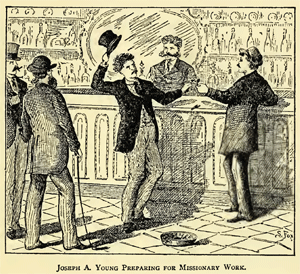
Joseph A. Young Preparing for Missionary Work.
These reports shocked the English Saints very much, and many of them were on the point of apostasy on account of it. My father did not doubt that there was some foundation for these stories, although he did not think the fellow could be so bad as he was represented; and he considered it his duty to take immediate steps to suppress the scandal, since it was doing very great injury to the cause of Mormonism. He accordingly represented this view of the case to Mr. Brown, who listened earnestly, and seemed quite convinced of the truth and justice of what my father had said. He took his leave, agreeing to "make it all right for Joe."
The following Sabbath, at the close of the services, my father said, "Mr. Brown will now have the opportunity to retract the scandal which he has put in circulation concerning Joseph A. Young."
Mr. Brown arose before the thousands of people assembled there, and acknowledged that he had misrepresented the character of the Prophet's "beloved" son, and, in the blandest manner possible, made it appear that Joseph was perfectly pure, upright, and moral, and entirely above reproach.
The chief object of this farce was to prevent apostasy; another was to save the Prophet's son from infamy and disgrace. My father, on his return to America, learned that Mr. Brown's reports were all true, and were not exaggerated in the least. Yet this dissipated libertine was considered sufficiently good to preach the truths of the Mormon religion to "a world lying in darkness."
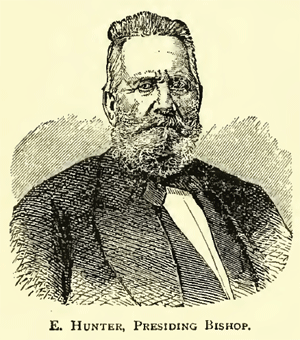
E. Hunter, Presiding Bishop.
Brigham Young's sons usually distinguish themselves while on their missions, rather by their aptitude at getting into scrapes than by the number of converts which they make. Brigham Jr. -- "the probable successor," or, as he is familiarly called, "Briggy" succeeded in distinguishing himself in England. The story popularly told among the Saints is, that regarding himself, without doubt, as a "scion of royalty," and with the egotistical assumption and the assurance which characterize his father, and which he honestly inherited, he actually ventured, in spite of the law, to drive the same number of white horses before his carriage that the queen had on her carriage, and that he was arrested and fined a hundred and fifty thousand dollars for the offence. The true account of the matter is, that when driving in one of the London parks, in a state of inebriety, he committed a trespass, for which he was arrested and mulcted in the ordinary fine -- a few shillings, I believe. Brigham, however, is said to have profited by the exaggerated story, and to have made capital out of it.
The donations that year had been unusually large, for Brigham had announced his intention of "emigrating" a larger number than ever before, and, as a consequence, the "Perpetual Emigration Fund" must, be correspondingly increased.
"Brethren and sisters," he commenced one day, in his most delicate and refined style, "you must retrench your expenses. You have been travelling in a direct line towards eternal damnation for a long time; now you must turn about, and show to the Lord and His holy angels that you still desire to be numbered among His people. I intend, this year, to bring over every Saint from the Old Country, and you must take hold and help me. I want the sisters to leave off their ribbons and finery, and stop running to the stores. I want you, one and all, to stop using tea, coffee, tobacco, and whiskey, and the money you would spend for those things you must donate for the emigration of the poor in Europe. Now is the time to manifest your faith by your works."
All the Saints in the Territory were personally called upon to assist in the work, and responded generously, if not willingly. Poor women contributed their mites, and poor men gave of their hardly-won earnings, that could ill be spared, as they could barely support their families at the best. In England, also, they were made to contribute, and many a working man was compelled to donate an entire week's wages. The English Saints gave willingly, and suffered the privations caused by their generosity cheerfully, as they confidently expected to be gathered to Zion that year. But their suffering availed them nothing, and their generosity was but ill repaid. It was years before many of these patient, long-enduring Saints saw the Zion of their hopes.
As the Prophet has a most decided objection to seeing any of his followers becoming independent in worldly affairs, either because he is afraid they will be able to act without counsel or advice from him, and so get beyond his power to manage them, or because he is jealous of their pecuniary success, since he has often said that he was the only man in the Territory who knew how to make money or how to use it, he always finds some way to put a stop to their growing prosperity. His usual method of doing this is by sending them on a mission. Of course their business is at a standstill altogether as soon as the heads of it are away; and it either remains quiet ever after, or, if it is sufficiently lucrative to make it worth while, Brigham manages to get it into his own hands, and it is as completely lost to its rightful owners as though they never had possessed it.
For a number of years, two men -- named Badley and Hugh Moon -- worked a whiskey distillery in Salt Lake City, and appeared to be becoming rapidly wealthy. They were good Mormons, staunch defenders of Brigham Young, ready in every good work with open purses and generous deeds, and they were highly respected by the entire body of Saints.
What was the consternation of the church, when, during the delivery of a temperance sermon on Sunday, the President, waxing more personal, more eloquent, and consequently more abusive, "cursed, in the name of the Lord," the men that ran the distillery!
They knew very well that these men paid their tithing promptly, -- the greatest virtue a Mormon can possess, by the way, -- and that they were foremost in all charitable works, and they marvelled very much that the Prophet should deal so hardly with them. His language was so abusive that Badley, who was especially attached to the President Young, shed tears during the denunciation. He finally finished his anathemas by ordering them to take their families and go on a mission to an unsettled portion of the Territory, leaving their homes to "the church," which, of course, meant Brigham Young.
As soon as they had gone, the Prophet removed the apparatus for distilling a few miles from the city, and commenced making whiskey for the church. But, unfortunately, the church whiskey did not prove to be so good as that made by Moon and Badley, and the church distillery was short-lived.
The men who were thus heartlessly ruined and unjustly exiled never returned. Their homes were broken up, their property taken from them, and themselves and their families banished to the wilderness, to gratify the covetousness and grasping of an avaricious tyrant, who committed this outrage, as he has all others, with a "Thus saith the Lord." Brigham's missions may be considered moral "Botany Bays," where he sends those persons who in any way incur his sovereign displeasure. It is an easy way of punishing offenders; and so common has it become, that lately, whenever a man is sent away on this errand, the spontaneous question which arises to every lip is, "What has he done?" This is specially true of the younger men. In case of a certain trial which took place some years since, Brigham had given his wishes to a portion of the jury as to how the case should be decided. After retiring, those of the jury who had received instructions from the Prophet came to a decision very readily, while those who had not been "interviewed" by him could see no justice in the way they had decided, and consequently refused to agree with the others.
Brigham was exceedingly angry at this, and took them very severely to task for their disregard of his known wishes.
"Well, Brother Brigham," said one of the obstinate jurymen, "the law will sustain us."
"The law!" said the Prophet. "What do you suppose I care for the law? My word is law here. I wish you distinctly to understand that; and," he continued, "those men who decided against my view of the case shall pay the penalty."
Very soon after that, one of these men, whose only fault had been that he would not be coerced into committing what he knew would be a gross injustice, was sent on a mission to China; another was ordered to Japan, a third to the Sandwich Islands, and one quite old gentleman was appointed to Las Vegas. This man having grown gray in the service of the church, Heber C. Kimball ventured to propose that, in consideration of his age, he be allowed to remain at home, and his son sent on the mission in his stead. The father was actually too feeble to be of any service in building up a new place, and Las Vegas was considered an important point to secure; so, after much deliberation, it was decided that the son should go in his father's stead. Seventy-five families were ordered to abandon their homes, and take their departure for a new and almost unknown portion of the Territory.
They expended thousands of dollars in building, fencing, and every way beautifying and improving their new homes; and just as they were getting nicely settled, and had made their new homes habitable and comfortable, the Prophet pronounced it an utterly unsuitable place for a "Stake of Zion," and ordered them all back again; so that the years passed there, and all the expenditures, were a total loss. After the son of the aged juryman had paid the penalty of his father's sin, he returned to Salt Lake. He has ever since fearlessly expressed his opinion of the Las Vegas mission, in terms not very flattering to its originator, and Brigham has been obliged to withdraw the hand of fellowship from him, very reluctantly indeed, as he had been a faithful servant to the President's interest for several years.
As a comment on his often expressed contempt of the law of lawyers, I wish to say just here that his son Alphilus Young is at this present time a law student at the University of Michigan, sent there by his father to carry out his own ambitious plans for his son's future, and also to have a lawyer in the family, since he has been forced to have so much to do with the law in late years.
It must not be supposed that none others are sent on missions except those who are to be punished, or got out of the way for a while. Brigham Young is shrewd, and so with these he sends every year prominent members of the church. All the apostles, and most of the leading elders, have been in the mission work, both in the States and in Europe, and it is in response to their efforts that so many converts have been made.
The period of my father's stay in England was one specially marked for success in mission work. Very many of the leaders of the church were there then, and mighty efforts were made to secure converts. They worked day and night with unabated zeal, and so great was their success, the whole world marvelled at the number of converts who came yearly to Zion.
In the mean time, the families of the missionaries were getting on as best they could at home, deprived not only of their husbands' society, but of the support which they gave them when at home, — scanty enough in some cases, I assure you, and yet just as much missed as though it had been larger, since it was the all; and above all, there was the horrible shadow of polygamy hanging over them; for no wife ever knew how much her husband may have been moved to "enlarge his kingdom," and the young English girls were apt to be very much taken with the American elders, and they in turn submitted without much struggle to the fascinations of their youthful converts. Very few of the missionaries failed to bring home an English wife, or at least to induce some young girl to emigrate to Zion, with the prospect of becoming his wife on her arrival.
At first polygamy was not preached. Indeed, so very careful were the elders not to mention the subject, or else to deny polygamy altogether, that many of the girls supposed themselves to be the first and only wives of the men whom they married; and it was not until they reached Utah, and were introduced to their husbands' "other wives," that they were undeceived.
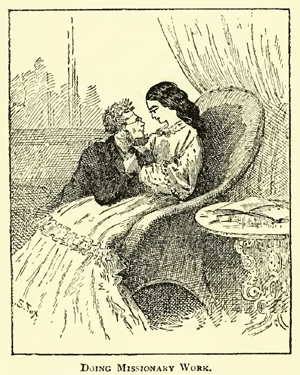
DOING MISSIONARY WORK.
So strong was the feeling in England, that for some time after polygamy was openly practiced in Utah, the missionaries denied it, and men who had four and five wives living quoted largely from the Book of Mormon, and other church works, to prove the impossibility of the existence of such a system. At length, however, they were obliged to confess to the truth, which they did by causing the "Revelation" to be published in the ''Millennial Star,'' the church organ published at Liverpool. For a while it seemed almost as though all the labors of the missionaries would go for nothing, so many apostatized. By strenuous effort and redoubled endeavor, however, many were still held in the church. They were told that polygamy was optional; that while the leaders of the church, many of them, practiced it, "for conscience' sake," since the Lord willed it, yet many more had not entered the system, and probably never would, and that no one need enter it, unless they felt themselves especially "called by the Lord."
In England, as in America, the men became much more easily reconciled to the doctrine than the women. The latter had many bitter hours over it; and yet each one, as all their American sisters before them had done, thought her husband would not take a polygamous wife, although he might believe in the theory, and uphold those of his brethren who converted the theory into practice. They had to learn, in the intensest bitterness of suffering, what other women had learned before them —that their husbands were like the majority of men, who had temptation so persistently thrust in their way.
Even now the men who go on missions are very guarded in preaching the doctrine, and advocate it only where they are very certain that it will be received. They admit its existence, but they by no means are willing to confess to what an extent it is practiced; and to this day many of them win wives under false pretences.
It was only a few weeks since, a gentleman living in the British Provinces, on a visit to some friends in New England, spoke of a visit he had received quite recently from a lady friend from England, a relative, I think, who had become converted to Mormonism, and married one of the elders of the church, and was on her way to Utah with him. She was a very lovely person, and in talking of her new religion, concerning which she was very enthusiastic, deplored the existence of polygamy as its only drawback to a perfect faith. Yet she said her husband had told her that it was only a doctrine of the church that was rarely practiced, except by the older Saints, who had received the Revelation directly from Joseph, and had considered the adoption of the system a duty; that in time it would be entirely done away with, except in theory, and that at all events she need have no fear.
Great was the surprise of the gentleman on learning that she, who so fondly believed herself the only wife of her husband, made Number 5 or 6 of his plural wives. The poor girl had, without doubt, learned the truth long before, although her pride, no doubt, would prevent her from informing her friends how cruelly she had been duped.
The Mormon mode of managing missions troubled me very little during those early days. I missed my father, and wished President Young would let him come back; beyond that I had little thought or care. I was busy studying with my mother, and I of course was taught the elements of the religion in which she so firmly believed, and on which she so greatly depended; and, like all children of Mormon parents, I was baptized when I was eight years old.
The Mormon people do not baptize or "christen" their infant children. When they are eight days old they are "blessed," and they are baptized at eight years of age. I was baptized by Bishop Taft, my father's second wife's father; and I was exceedingly terrified. I was taken to a pond, and the bishop carried me in his arms, and plunged me into the water; and so great was the nervous shock that I could not think of it without a shudder for years after.
My mother was glad when it was over, for I was made a child of the church, and by this rite she consecrated me to God and the Mormon faith. To God I still hold loving, trustful allegiance; as for the Mormon faith, I can never be too thankful that I have so entirely freed myself from its tyrannical fetters, that held me, soul and body, in such a long and cruel bondage.

